Feeling tired at work: 5 ways to eliminate work fatigue (+ 1 bonus!)
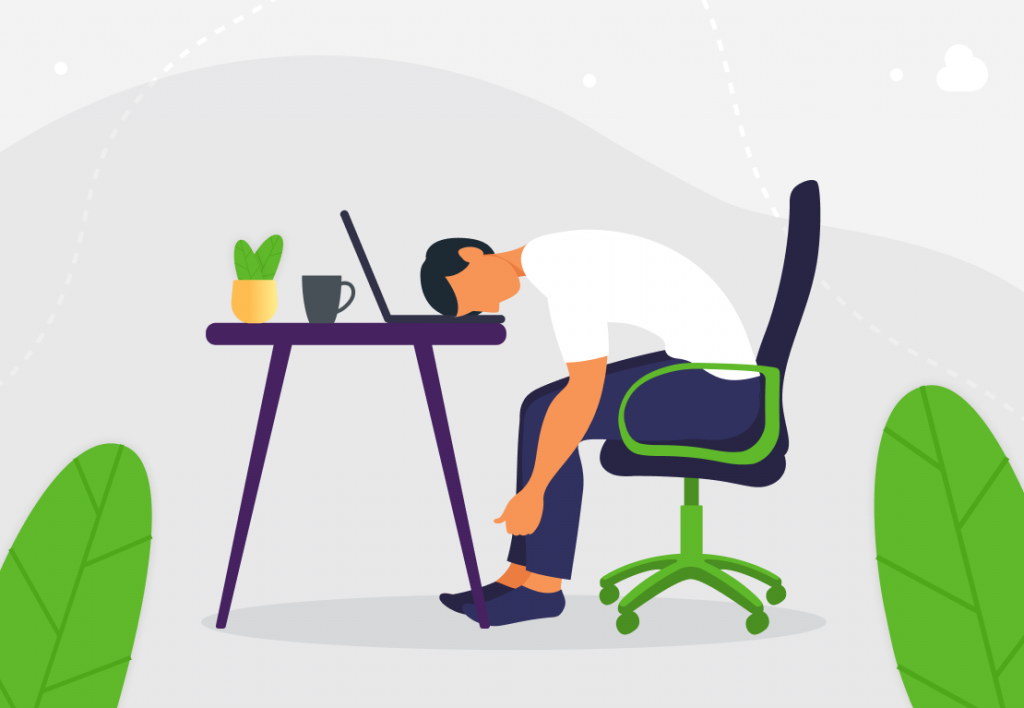
Tired at work – we’ve all experienced it, and we’ve all tried to deal with it. It’s normal to have a little “slump” from time to time or feel sleepy at work on Friday after a challenging week. Yet, a feeling of seemingly never-ending fatigue at work is something completely different and requires one’s careful attention.
Why?
Want to get the most out of your time?
Try DeskTime for free!
Try free for 14 days · No credit card required.
By signing up, you agree to our terms and privacy policy.
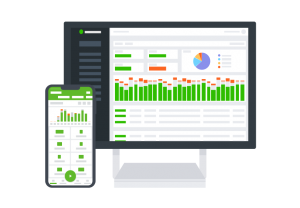
A prolonged period of feeling tired at work can easily lead to complete job burnout, which is much more difficult to overcome. Plus, the brand-new era of remote work comes with a fresh set of challenges that can lead to severe work fatigue if left ignored.
So, to avoid job burnout dangers, tiredness at work – both in remote and office settings – needs to be taken seriously. What to do if feeling tired at work has already caught you, and you can’t shake it off? And what are some of the don’ts when dealing with work fatigue? Let’s dive right into this article and find out!
Is this work fatigue that I’m feeling?

First things first – what actually IS workplace fatigue and what isn’t? Well, it’s a fine line between one and another. However, according to this study:
Work fatigue represents extreme tiredness and reduced functional capacity that is experienced during and at the end of the workday.
It’s a mix of physical, mental, and emotional tiredness that isn’t removed by adequate rest and sleep time. Such fatigue reduces one’s ability to focus, perform tasks and lowers motivation. There’s a variety of stressors that lead to being too tired to work, and experiencing a time of crisis, such as a global pandemic, undoubtedly is one of them. Luckily, there are ways to help yourself if seemingly neverending work tiredness has put a spell on you.
What to do if workplace fatigue symptoms have already caught you
1. Maintain work-life boundaries

Even though you’ve probably heard this advice oh so many times, the message doesn’t lose its significance. Healthy work-life boundaries are THE thing to keep in mind when dealing with work fatigue. Even if you genuinely love your job, your mind and body still need a decent time off to restore their capabilities.
Leave work at work. Don’t check your email after working hours. Be aware that you’re not obliged to be accessible to your workplace 24/7 (unless specified otherwise). A well-rested and energized worker, both physically and mentally, is far more valuable than an overworked person. Being available for work-related requests at all times doesn’t leave you enough time to recharge and leads to workplace fatigue symptoms.
When it comes to remote work, boundaries between work and “no work” undoubtedly get blurry. We find it harder to unplug and end the workday on time, as the only evening commute we do is from the home office desk to the sofa (if so).
To help yourself draw the line, consider inventing an end-of-workday ritual. Turn off the computer, go for a walk if possible, or break a sweat at home. It can be anything that marks the end of the workday to you specifically.
2. Take care of your health

Work fatigue can also be caused by ongoing health problems, which undoubtedly need to be addressed by a healthcare specialist. If you’re confident that your general health indicators are within the normal range, it is worth reviewing your daily habits.
Poor diet, lack of exercise, and deprived sleep undeniably contribute to your daily energy levels and productivity at work. Not getting enough sleep heightens the risk of dehydration, which has a direct impact on your performance.
When your body isn’t hydrated enough, you can feel weak and tired. Therefore, water is essential for carrying nutrients around the body and getting rid of its waste products. Make sure to drink plenty of beverages and eat water-filled food during the day. If staying hydrated seems challenging to you, consider using a hydration app to help you stay on track with your water intake.

Your diet is another aspect that affects your energy and productivity levels more than you may think. For example, consuming a lot of carbs – bread-oriented, sugary products – can give the energy boost at first, yet the effect afterward is the opposite. Your brain is overflooded with hormones related to sleep, and you begin feeling tired. Maintaining such a diet pattern daily can cause fatigue as well.
When it comes to exercise, it can significantly reduce work-related fatigue by increasing one’s energy levels and strength. Moreover, regular low-intensity exercise, such as a walk, light jogging, or a casual bike ride, decreases fatigue, reduces stress levels, and improves sleep. Not a fan of exercising? Again, there are plenty of tools and apps that make the physical activity fun and easier to maintain.
3. Plan your schedule according to your productivity patterns
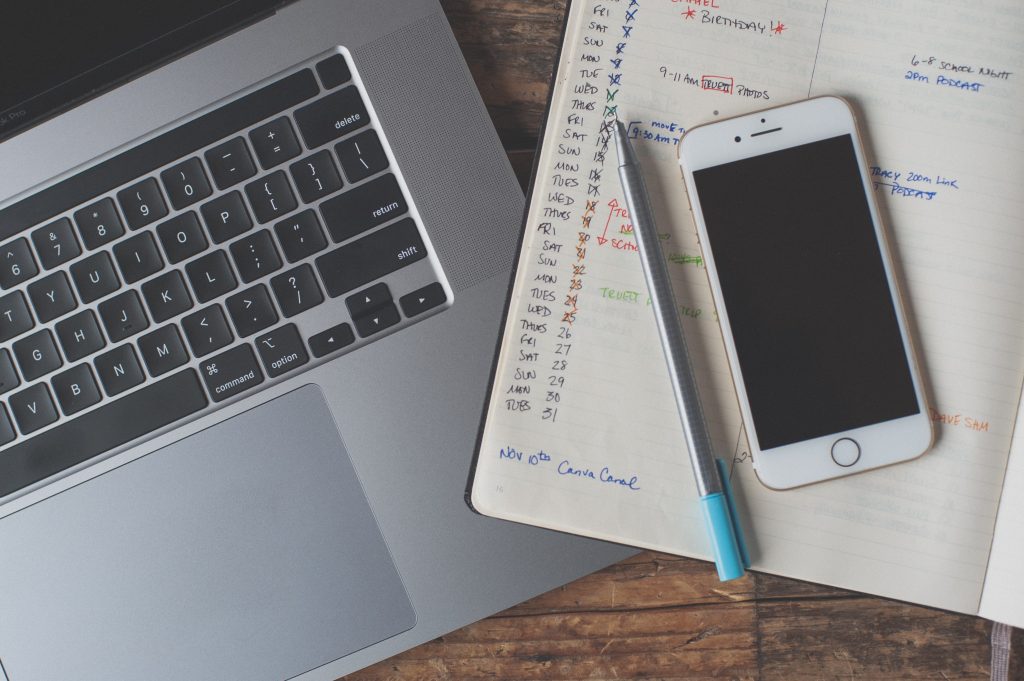
Another cause for feeling tired at work may be working on a schedule that doesn’t align with your individual “biological clock” and productivity patterns.
We all follow an individual internal cycle of wakefulness and sleep – circadian rhythm. It’s relatively easy to conclude whether you’re, for example, a morning person or not without a specific analysis. But when it comes to being aware of your productivity peak hours, you definitely can use some guidance.
DeskTime’s automatic time tracking tool not only helps with managing work hours and projects but also provides a thorough analysis of your productivity levels. Reports on your productivity and efficiency are available in a daily, weekly, or monthly format. The monthly analysis may be the most useful to fully explore your productivity patterns as it shows you big-picture trends on how you spend your day.
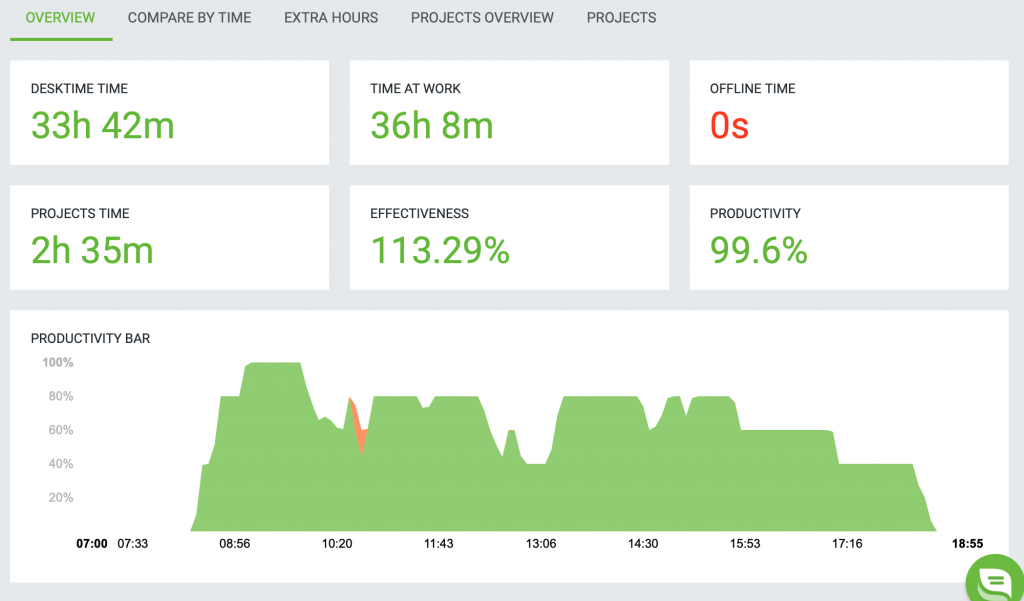
Knowing when your creative juices flow better or being aware that you have a daily efficiency bump at a particular time can significantly help in planning your work schedule.
- Easier to concentrate in the morning?
→ Schedule your meetings in the afternoon and dedicate the early hours to deep work.
- Productivity peaks in the afternoon?
→ Consider your options of starting the workday a bit later, so you don’t torture your body and mind with early morning sessions.
Remember – it’s all about being aligned with your body’s inner clock to reduce the risk of feeling tired.
4. Sleep the night away

Another essential aspect when dealing with work fatigue is making sure you’re getting a good night’s sleep. Sleep deprivation impacts your energy levels, cognitive functions, and motivation, which can quickly turn into general fatigue, affecting your work performance as well.
Have you ever experienced waking up in the morning after you’ve just slept for 8 hours, yet feeling, well, awful? This signifies that your sleep isn’t adequate, as the power of sleep lies not only in its amount but also in its quality.
While there can be various conditions affecting your sleep adequacy, one thing you can take care of is sleep hygiene. What can you do about it? Small changes bring great results:
- Stick to a consistent sleep schedule and have your pre-bedtime routine
- Don’t overdo naps during the day
- Dim the lights and ditch electronics (it’s tough but worth it)
- Make your bedroom your sleep temple – comfortable mattress, nice bedding, calming scents, etc.
- Don’t let light and noise interrupt your sleep; use earplugs and heavy curtains or an eye mask
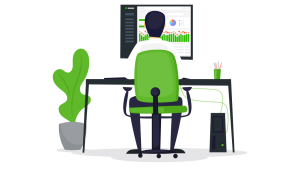
Want to prevent overworking?
Prioritize and set healthy boundaries!
Additionally, one of the key improvements you can make to boost your sleep quality and reduce work fatigue is prioritizing your sleep. It may sound pretty self-evident. However, many people don’t pay enough attention to the link between sleep and their well-being. Are you feeling constantly tired at work? Examine the quality of your sleep.
5. Consider taking a day off (and remember to take breaks during work)
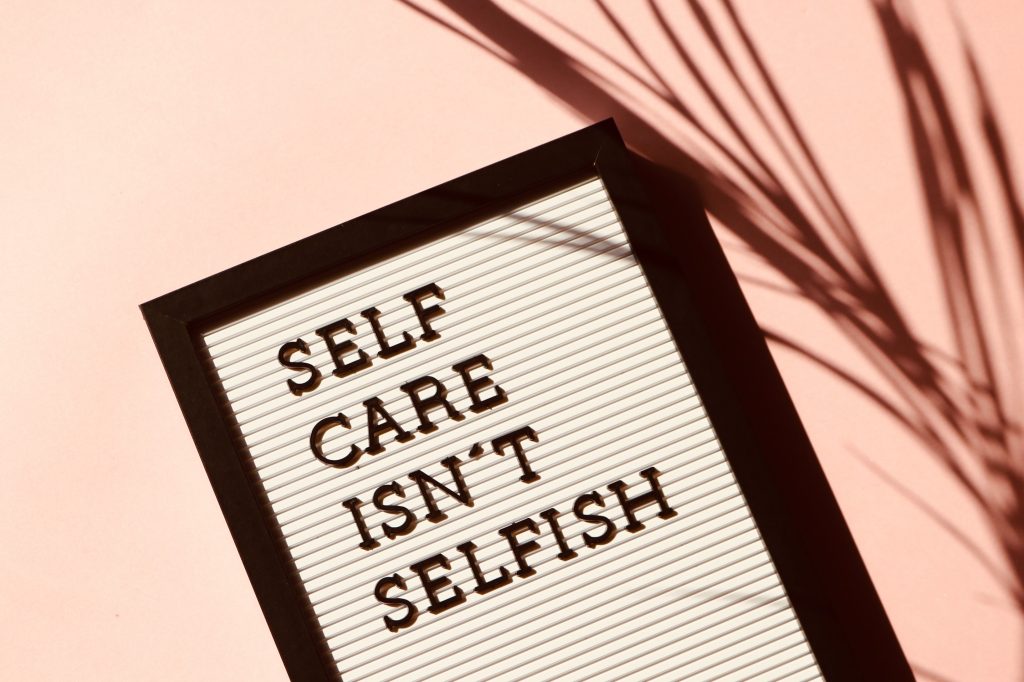
Taking breaks at work are just as necessary for work performance as keeping up your focus. According to research, the most productive employees work for 52 minutes and then break for 17. Working in such sprints gives their cognitive functions and body enough time to rest so that the next work session can be “kicked off” with excellent efficiency.
In case none of the methods of dealing with work fatigue seem to be working, you may want to consider taking a day off. Routine can be an enemy for creativity, motivation, and productivity. Having a day for yourself is crucial for your well-being and recharging yourself properly is significant in avoiding severe consequences such as chronic fatigue or complete burnout.
Whether you decide to “embrace laziness,” engage in fun activities, or deal with chores, make sure work stays at work and your day off is as present as it can be.
Bonus: What NOT to do when feeling tired at work

You know how sometimes we think that we know what’s best for ourselves, but in reality, we’re completely wrong? To make sure you don’t harm yourself when trying to overcome work tiredness, have a look at these few mistakes you may be prone to meet down the road.
→ Don’t push yourself
You may think that the key to overcoming work fatigue is to bear yourself even harder into work. “Pushing through” won’t solve the big issue of feeling tired at work in a way a proper rest would. So, instead of torturing yourself with an attempt of “full gear”, try dividing your tasks into smaller parts and setting priorities wisely.
→ Don’t punish yourself by working overtime
Of course, there are deadlines in this world that need to be met. Sometimes we all work longer than we should to finish some urgent tasks or compensate for a slower day with added work hours. But it shouldn’t become a regular occurrence.
Working overtime kills productivity. Your productivity levels begin to drop as soon as you’ve reached the 8-hour limit and continue their downfall till the very end. Take a look at this video to find out more about why working overtime is, well, nothing but a bad idea:
→ Don’t overconsume stimulants like caffeine, sugar, nicotine
Even though these stimulants seem to be working for some time after you’ve consumed them, their effects wear off pretty quickly. You may find yourself reaching for another cup of coffee or a piece of chocolate only to experience the same loss of the effect again later. Excessive caffeine consumption and other stimulants can disrupt sleep, heighten blood pressure, and cause other health issues that certainly won’t help overcome work fatigue.
→ Last but not least–don’t ignore the tiredness
Occasional fatigue at work can be linked to various causes, such as lack of sleep on the night before, a heavier workload, and such. However, if you’ve noticed feeling exhausted for a prolonged time without having a clear explanation, don’t ignore that. Fatigue can be a symptom of many physical and mental conditions that need proper medical attention. Be aware of how you’re feeling, and don’t be afraid to seek help if needed.
Did you find this article useful? Give it a clap!
Psst! You can clap more than once if you really loved it 🙂